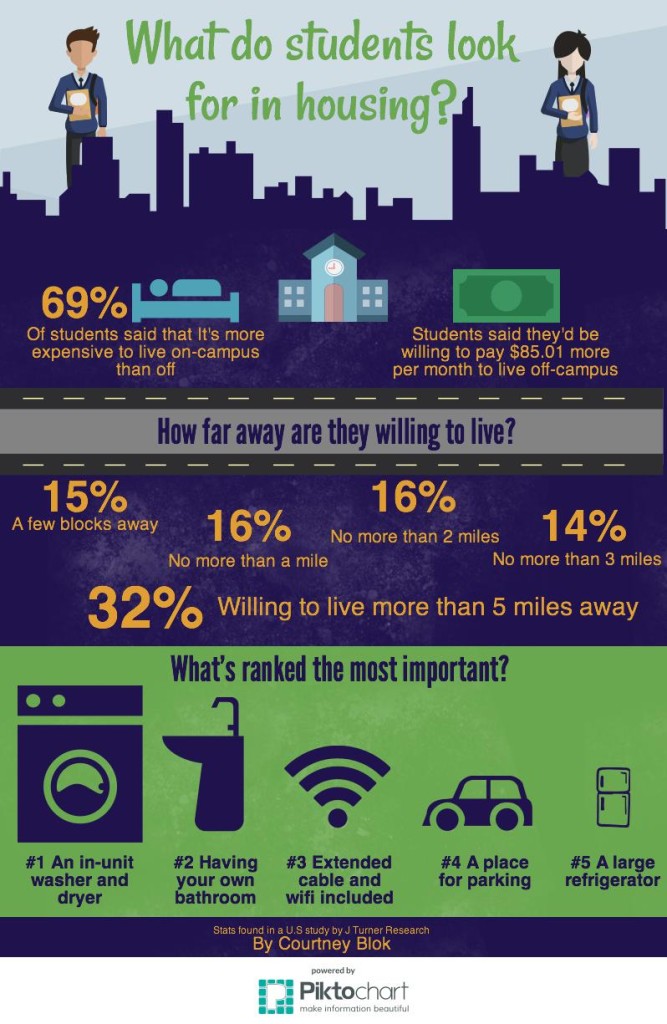BY COURTNEY BLOK
Wet basements, tenant drama and lack of respect – these are just a few of the problems that student landlords could face.
Jordon Caldwell, 20, who is in his second-year at Fanshawe College in London, lived in residence for the first semester, but after not having the best experience he and his mother looked into co-signing on a house.
“A friend of mine offered me one of their rooms in their house, and I was talking it over with my mom and she said it would be better if I purchased my own house and rented out all the bedrooms. That way I wouldn’t have to pay rent,” said Caldwell.
His mother, who has experience with rentals, helped him through the process. Even though she is there for guidance, Caldwell is the landlord and makes all the decisions about the house, while his mother focuses on the financial aspects.
Thomas Davidoff, associate professor at UBC’s Sauder School of Business, suggests that although the idea is good, students should consider the market and the location before taking the plunge into home ownership.
“I don’t know if it is a good idea today, but rentals make sense for occupants who are likely to move soon. Students don’t typically stick around long, so they are more naturally renters rather than owners,” said Davidoff. “High turnover is expensive to a landlord, and of course who wants drunk 20-somethings with not yet fully developed frontal lobes as tenants?”
Brett Wilson, a Visual Merchandising student at Sheridan, is also looking to become a student landlord. He is looking to purchase a house near Western University in London.
“I want to invest in a house near the school because it makes for a great student rental,” said Wilson. “I am looking for more than three rooms, at least two bathrooms and the basics, not too old of a roof, updated windows, dry and finished basement and some other smaller things.”
Caldwell’s main concern when buying his house was the quality and the price.
“We were looking at a few different houses and this one was a little further away from the school, but it was the nicest of all of them that we looked at and for the best price,” said Caldwell. “It also had a nice layout in terms for separating the upstairs and downstairs.”
MORE RELATED TO THIS:
- A comparison of local housing accessible by the Sheridan Shuttles
- The great housing debate: Residence or off campus
- A neighbourhood fights back
Davidoff says houses newer that don’t have major problems are the cheapest to operate.
But things can still go wrong.
“I think my biggest worries about investing in a house is that it could burn down, or something could be wrong with the house but for me not to find out until it’s too late, I guess my biggest fears are all based off of ‘what if’,” said Wilson.
Along with worries like these, Caldwell also faces the issues of being an in-house landlord.
“At first it was overwhelming, just because it’s the first house I ever bought and I am in college,” said Caldwell. “The hardest part is dealing with all the issues, whether it be with the house or roommate drama. People seem to think that the landlord should be the mediator, but that’s not the case.”
He also admits his age affects how his tenants treat him.
“One of my roommates is actually older than me, he’s not in school, just working. I definitely get the feeling that he thinks he doesn’t have to respect me as much as he should,” said Caldwell. “The other roommates, I’ve become friends with, so it’s kind hard that way too.”
Caldwell suggests that students looking into purchasing houses near schools go into it with caution.
“Make sure you are comfortable with the people who are moving in, and make sure that you are comfortable with the extra responsibility of up keeping the house and all the extra house. Yes you are living for free, but things do go wrong that cost money. Just keep that in mind.”


Comments
One response to “Stresses of being a student landlord”
What prospective student-landlords and anyone else considering buying rental properties must realize is that this is not just an investment. Unlike stocks, bonds, and mutual funds that can be sold quickly, it can take months to unload a house even in a strong market. And if prices decline, you may lose a chunk of principal for good.
You can’t expect to buy properties, sit back, and let the money flow in. Whether you have one property or 10, this is a business. And to be successful, you must view it as such. It also means taking on a lot of responsibility, both when buying the property and while owning it. Still, it is a risky and concentrated bet, just like any other business startup.
George Lambert
Author, What You Must Know BEFORE Becoming a Greedy Landlord. How to build a portfolio of investment properties for an income that lasts a lifetime.